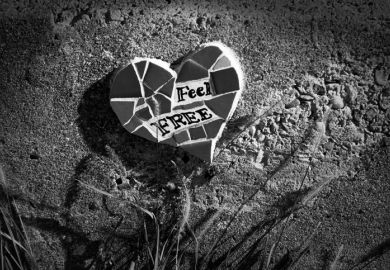If the man regarded as the godfather of neoconservatism is unjustly represented by Bush et al, what exactly were his beliefs? asks John Dunn
Most of Reading Leo Strauss was composed as occasional articles or lectures. Steven Smith's principal motive for writing them in their original form was to testify to the personal inspiration he had found in Strauss's writings and to explore just where Strauss himself stood on a number of issues. The impulse to assemble them now as a book comes less from the internal dynamics of Smith's own reflection than from a more adventitious and political purpose: to defend Strauss's memory against the damaging charge of having prompted, in a particularly insidious yet decisive way, the devastating indiscretion of President George Bush's assault on Iraq. (It may also have had the subsidiary purpose of rescuing the teaching from the odium that this ascription now threatens to visit upon it.) The earliest of the chapters, retitled "How Jewish was Leo Strauss?", must have been written before the first Gulf War, which even to a European socialist such as Norberto Bobbio looked very like a classic just war. It is hard to imagine Strauss objecting to US policy on that occasion, had he been alive to do so, and difficult to see why he should have needed any special defence, even had he elected to support it with some vehemence. The final chapter, "What would Leo Strauss do?", makes a compelling case for supposing that whatever Strauss in the end favoured (often itself no easy matter to adjudicate), it can scarcely have been the combination of self-deception with gross imprudence at the outset, in the service of a global crusade to eliminate evil from the world of politics.
In Smith's eyes, the baleful influence of the Straussians on the Bush Administration, in so far as it is not simply a journalistic hallucination, does a gross injustice to Strauss as a person and a thinker, and is an absurd distraction from any attempt to assess the continuing value of his thought.
It is interesting to consider how far any thinker is responsible for the ways in which others interpret him; and Strauss himself was often too maddeningly evasive in the ways in which he chose to express himself to escape all responsibility for being widely misunderstood. But whatever he meant to commend, it can scarcely have been the political touch of George Bush with the world beyond the borders of the US. By now, Strauss's teachings have been transmitted through several different academic generations and offered, among many others, to numerous complete idiots and some moderately evil people. They have also travelled far beyond the US, not least to France, Japan and now, unnervingly, to the People's Republic of China. There is everything to be said for Smith's purpose of turning back to the master and attempting to recover just what he really did believe.
The prospects for pinning down his beliefs seem distinctly rosier than those for recovering just what he was up to. To fathom the latter, you would need a great deal of documentation that may well no longer exist and, if it does, has been kept determinedly out of the public domain. This is a pity because Strauss was certainly a subtle and intriguing thinker as well as a forceful one, and any prudential need to restrict the conditions of his own comprehension (surely less pressing in Chicago than they must have been for Maimonides) can scarcely extend beyond the grave. The letters that have been published, notably those to Carl Schmitt and Alexandre Kojève, give Smith much of his most vivid material. It would be good to have had more, especially with less forensically engaged interlocutors, as well as more informal materials such as diaries and reading notes. Some has already emerged, and more presumably should emerge eventually, in the Stuttgart edition of Strauss's Collected Works . A really good intellectual biography of Strauss would require psychological flair and delicacy as well as a lot of intelligence and a very wide knowledge of context. One reliable inference from Smith's book is that such a biography would be immensely worth having; Reading Leo Strauss simply whets the appetite.
Where Smith succeeds more handsomely is in rescuing for a wider audience (and in the teeth of their author's writing practices) the vivid and immediate interest of Strauss's own texts. At the centre of these lay what Strauss called, borrowing a formula from Spinoza, the theologico-political problem, dramatised as the struggle, tension or choice between Athens (the fons et origo of philosophy, or untrammelled critical thought) and Jerusalem, sacred city of three great faiths.
It is worth pressing the question, certainly pertinent as Strauss's teachings fan out across China, just for whom the theologico-political problem really is a problem, rather than an arena for political manoeuvre or a space for existential exploration or adventure. What generates the tension between Athens and Jerusalem is the judgment or choice of which elements of belief to place in question (and thus in jeopardy) and which to defend to the bitter end. On this score, on Smith's reading, the answer to his question "How Jewish was Leo Strauss?" comes out as: robustly so in lineage, identification and political solidarity, but somewhat shiftily or tepidly so when it comes to ultimate belief or personal devotion. Looking at the history of Western philosophy from this angle can be exceptionally illuminating, as in Strauss's hands it sometimes certainly was. It cannot, naturally, guarantee the judgments that issue from it; and duly, again in Strauss's hands, as in the case of John Locke, sometimes failed to protect him against major misjudgments of just where a great thinker of the past stood on this fundamental issue. But whatever the detailed felicity of the technique of discovery that Strauss passed on to his pupils, it left them an endlessly rewarding range of questions to ponder.
Unfortunately it also left them with an extremely irritating way of reporting the upshot of their reflections, softened or exacerbated by contrasts in temperament and acuity. One example would be the matter of tyranny, the focus of one of Smith's most suggestive chapters. Strauss clearly believed that the dynamic of Western philosophy - and its bastard progeny in the social sciences - had somehow corrupted modern political judgment, both in theory and in practice, squandering the relative clarity of ancient perceptions of the reality of tyranny in favour of ways of seeing and thinking about the grimmest political phenomena, which were spiritually, morally and politically obtuse. The key issue here is just why he believed that it had had this effect and how, if at all, he supposed it might still be possible to recapture the immediacy and sanity of ancient perceptions.
There could hardly be an issue of greater political urgency, or one about which it was more imperative to think as clearly and speak as frankly as lay within your powers. One possible view of the determinants of this devastating perceptual loss, hinted at in Natural Right and History in 1953, was that the epistemic or ontological fissure between fact and value, a deep implication of what philosophy had since become, had rendered value opaque in the world of politics, blinding all who succumbed to philosophy's suasions. Strauss clearly deplored the outcome, but did he also think that the philosophy that had somehow generated it was mistaken, and mistaken more particularly in the ever-widening scope of the beliefs it chose to place in doubt?
Smith makes a good case for supposing that Strauss was very much a sceptic, but he casts little light on just how Strauss chose (or attempted) to live his scepticism - or saw it as bearing on, or even transforming, his own life. At this point the relative paucity of the biographical materials and the comparative pudeur of his treatment of the master's inner thoughts becomes disabling. The more seriously you take what Strauss contrived to see and meant to convey to his disciples, the less readily you can accept an interpreter going off the air at this point.
If Strauss was a kind of liberal, and not a conservative without a country to conserve, or a black reactionary for all future times and places, what kind of liberal exactly was he, and how far were his reasons for being that kind potentially good reasons for others to be so elsewhere and later (including, for example, China the day after tomorrow)? If Strauss's politics were so clearly distinct from those of Paul Wolfowitz over the past decade, how exactly can good disciples judge for themselves how to avoid misapplying them in future? How would those politics apply today to Jerusalem, and the twin populations that stand in such deadly peril there? What could lift the shadow of tyranny durably from all the inhabitants of that beautiful haunted city, fought for and loved and longed for like nowhere else on earth? What would Leo Strauss do there and now?
John Dunn is professor of political theory, Cambridge University.
Reading Leo Strauss: Politics, Philosophy, Judaism
Author - Steven B. Smith
Publisher - University of Chicago Press
Pages - 237
Price - £20.50
ISBN - 0 226 76402 8
Register to continue
Why register?
- Registration is free and only takes a moment
- Once registered, you can read 3 articles a month
- Sign up for our newsletter
Subscribe
Or subscribe for unlimited access to:
- Unlimited access to news, views, insights & reviews
- Digital editions
- Digital access to THE’s university and college rankings analysis
Already registered or a current subscriber? Login



